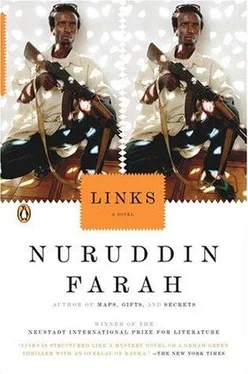“You know what pisses me off?” Seamus said.
“Tell me.”
“What pisses me off no end is how easily they dispense with the formality of a postmortem. They cart you off and away with the enthusiasm of a two-pot screamer heading for the pub, murmuring a few verses. I won’t stand for any of that. I’ve drawn up my will, and Bile has a notarized copy of it in the event of anything unexpected. I don’t wish to be planted in the earth fast. In fact, the mere thought of it kills me. I’ve provided Bile with a pile of cash locked in the safe. I want to be flown out of here, with the leisured slowness of an Irishman, and I want a wake and lots of drinking and feasting. That’s what I want!”
Then all at once, he wore an expression that Jeebleh didn’t know how to interpret. He remembered Seamus’s charming cheekiness, his posturing, his clowning.
“How’s your mother?” Jeebleh asked.
Seamus looked sad, and exhausted from jet lag. The color rose in his cheeks, and he said, “She’s tough as nails, and obstinately holding on. Thanks for asking.” His eyes dimmed and after a pause he said, “Sorry about yours. Please accept my belated condolences.”
Jeebleh looked steadily at Seamus as he poured coffee from the espresso machine into two cups, then passed one over. “Tell me your latest,” he said, “and then let’s work our way back to when we last met.”
“I’ve just come from Ireland,” Seamus said, obliging, “with a duffel bag of money to top up what Bile and I had between us, so we can keep The Refuge going until we run out of charity money again. As you can see, we’re all fine, may God help us, and the fat is not in the fire yet! We’re optimistic, despite the disappearance of our dearest, Raasta and Makka.”
“I’m not sure Bile’s told me how you got here the first time,” Jeebleh said. “If he has, I don’t remember. Anyway, he and I still have to catch up with each other. It is a bit of a blur, all that I’ve learned. So why Mogadiscio?”
Seamus was so still that Jeebleh thought he had seen a green-eyed fairy. “My life was gathering dust,” he said, “cobwebs forming in the corners, because of my nine-to-five job. The more the dust gathered, the more fits of uglies I had. I traveled a lot, but my travels were always work-related. I would spend a week in New York, two in Bangkok, a couple of days in Melbourne, then a month in New York, and another in Nairobi, always traveling and always working. I was in terrific demand as a simultaneous interpreter, and the pay was top-notch. I couldn’t complain about being everyone’s favorite, but it was getting to me.”
“What’s wrong with pegging away at work?”
“I hated becoming a gun for hire,” Seamus said. “You’ll remember I speak seven languages that are understood in areas of the world held apart by the guttural, the tonal, the diphthong, and other tongue-twisting differences. Well, I was on the road for long stretches of time. I made pots of money, but that wasn’t good enough, and I was on the verge of freaking out. I was lonely, and my life felt as though it had no purpose.”
Jeebleh said, “What passport do you travel on?”
“British.”
“Your loyalty lies with Britain or Ireland?”
A lightning sense of humor flashed in Seamus’s eyes, and he grinned. When Jeebleh looked at him, puzzled, Seamus said, “Funny you should ask that.”
Jeebleh waited patiently. In Padua, Seamus used to describe himself as “a colonial”! And since he was at a loss to find an equivalent word in Italian, he would often just use the English, and explain it to those who had no idea what he was talking about.
Now he said, “My loyalties do not lie with the Union Jack, for sure. Mine’s an all-inclusive Irish loyalty, with a good measure of cosmopolitanism. The idea of owing allegiance to a country is foreign to me.”
“You haven’t answered, Why Mogadiscio?”
“Because Mogadiscio was there, in Africa!”
“What about Mogadiscio? What about Africa?”
“I used to donate a little more than a third of my earnings to charities in Africa, when cobwebs laden with the memories of a spider started to waylay me. Thinking of our friendship and our closeness turned to Africa into a cause. For me, Africa became my cause!”
“You never thought of Ireland that way?”
“No. I ruined Ireland for myself a long time ago, did some things there I couldn’t go back and live with.”
“And what might that have been?”
Seamus’s eyes dodged, and his conversation followed. “Mogadiscio seemed to be the ideal place for me.”
“Hiding out with warlords and mercenaries?” Jeebleh countered jokingly.
“And Bile too! But yes, you’re right.
“I was on the run most of the time anyhow,” Seamus said, after a silence, “spending a week on a curry-and-chow-mein tour, Delhi for a weekend, Hong Kong for a day. This wasn’t work, but run, run, and run, a lifestyle with no room for reflection, a life meaninglessly held together by a major absence: love! I’m not speaking of loving a woman or a man, don’t misunderstand me, but of a good, plain, old-fashioned, sixties-style personal commitment to love.”
“And what have you found coming here? Love?”
“Will you forgive a cliché?”
“Go ahead.”
“I’ve run into my self, coming here.”
“Is this good or bad?”
“There’s a purpose to my life now: Raasta!”
Then he was back to when he decided to come to Mogadiscio: how he bought the New York Times Sunday edition at midnight, in San Francisco; how he read about a UN-funded job in Somalia; how he applied; how he was short-listed; and how he was selected. He packed lightly, convinced that he would hate it. But he didn’t. He met Bile—“It was more like running into my self”—and Raasta; he stayed. “Perhaps there’s some truth in the wisdom that there is no happiness sweeter than the happiness built on someone else’s sorrow. And this city has enough sorrow, with much deeper foundations.”
“That’s how Mogadiscio has struck you?”
Seamus replied, “Mogadiscio, because of Raasta, is what a straw dripping with water is to a man dying of thirst. I’m aware of the fact that it’s a death trap, and because of this my heart goes out to those who’re caught up in the fighting, and those who cannot help losing themselves in its politics. I am here to stay, that’s what matters.”
“And the cobwebs?”
“Vamoose!”
Jeebleh wished he could say that about himself. But then, he hadn’t come to sweep clean the corners of his life that had grown dustier from neglect. And while eluding death, he would lay his mother’s troubled soul to rest. He knew this was a tall order, but worth trying.
“Tell me about yourself,” Seamus said. “Why are you in Mogadiscio?”
“I’ve come to ennoble my mother’s memory.”
Seamus knew that there were occasions when it was best not to say anything, not to even bother with condolences, because there are no words with which to express one’s sentiments satisfactorily. He had heard a great deal about the mothers of Jeebleh and Bile, but it was difficult for him to imagine them alive, a lot easier to think of them as dead. He had a vague memory of some controversy to do with Jeebleh’s letters, but Seamus wasn’t sure if Caloosha had been involved, and in what capacity. He seemed to remember it was Shanta who had spilled the beans on this aspect of the controversy.
“How do you plan to achieve that?” Seamus asked.
“I’m working on it.”
“Is there anything I can do to help?”
“Thank you.”
Seamus now had a disheveled expression as he asked, “Have you seen Caloosha, since coming?”
“I’ve seen him. Have you?”
Читать дальше












